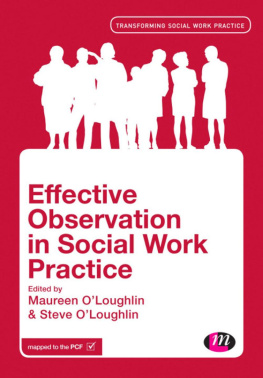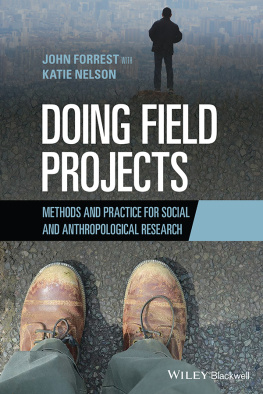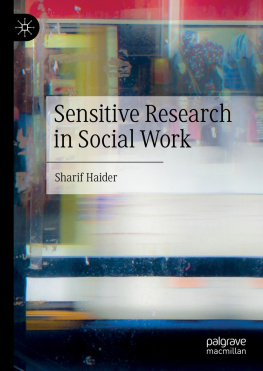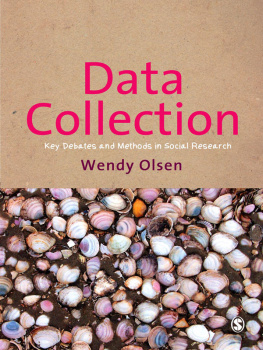Doing Social Work Research
Doing Social Work Research
Louise Hardwick and Aidan Worsley
Louise Hardwick and Aidan Worsley 2011
First published 2011
Apart from any fair dealing for the purposes of research or private study, or criticism or review, as permitted under the Copyright, Designs and Patents Act, 1988, this publication may be reproduced, stored or transmitted in any form, or by any means, only with the prior permission in writing of the publishers, or in the case of reprographic reproduction, in accordance with the terms of licences issued by the Copyright Licensing Agency. Enquiries concerning reproduction outside those terms should be sent to the publishers.
SAGE Publications Ltd
1 Olivers Yard
55 City Road
London EC1Y 1SP
SAGE Publications Inc.
2455 Teller Road
Thousand Oaks, California 91320
SAGE Publications India Pvt Ltd
B 1/I 1 Mohan Cooperative Industrial Area
Mathura Road
New Delhi 110 044
SAGE Publications Asia-Pacific Pte Ltd
33 Pekin Street #02-01
Far East Square
Singapore 048763
Library of Congress Control Number: 2009943560
British Library Cataloguing in Publication data
A catalogue record for this book is available from the British Library
ISBN 978-1-84787-912-7
ISBN 978-1-84787-913-4 (pbk)
Typeset by C&M Digitals (P) Chennai, India
Printed and bound in Great Britain by TJ International Ltd, Padstow, Cornwall
Printed on paper from sustainable resources
Aidan Worsley would like to dedicate this book to his mother and father, Bill and Olive Worsley. Dad, I think of you every day.
Louise Hardwick would like to dedicate this book to Monica, Tom, Ursula, Molly and Leo.
CONTENTS
ACKNOWLEDGEMENTS
This book could not have been written without the contributions made by all the service users, carers, students and practitioners we have met and worked with over the years. Their imagination, commitment and determination are applauded. We would also like to thank our colleagues at the universities of Liverpool, Central Lancashire and Chester for their comments, observations and insights that have also helped shape this book and move it towards completion.
INTRODUCTION
Its a little perplexing that relatively few social workers appear to be doing research into practice. Who better to interview service users or run a focus group of carers for the purposes of research than social workers? Who better to analyse complex situations and make a sound assessment based on the evidence? Surely social workers know more about social work than anyone else, possess the right value base and an enviable range of transferable skills for research that equip them commendably. And yet, research appears to be in its infancy for practitioners in the social care workforce. We would argue that research involving social workers (and service users) tends to be done to us rather than with us. Even less often is research actually done by us. This is perhaps even more surprising when we start to think more globally about the nature of social work.
The social work profession promotes social change (International Federation of Social Work, 2000). These are the very first words of an important definition of our vocation and they beg the question in what ways do we really promote social change? Similarly, the (UK) Code of Practice has, as its first line: Social Care Workers must protect the rights and promote the interests of service users and carers (General Social Care Council, 2004). The question of how we might respond to these fundamental challenges to our professional practice is given an answer: practitioner research. This book is written especially for every social worker, whether on a qualifying training course, post qualifying programme or simply a practitioner in the field. This book will also provide help to those throughout the social care workforce who are interested in learning more about doing research. It is a book designed to help people research their practice and roots itself in the kinds of research that a typical social worker might consider doing. Its a very practical guide, using examples drawn from practice throughout. But its main emphasis and main hope is that it is about doing social work research. We aim to inspire, enable and encourage the reader to engage in research because we think that is what is best for the profession and, more importantly, the many millions of service users and carers that social workers support, challenge and empower throughout their careers.
HOW THE BOOK WORKS
The whole point of this book is to encourage research by talking about it in a clear, uncluttered way, avoiding unnecessary jargon. It tells social workers what they need to know to begin doing research and, in that sense, should be seen as an introductory text although it will suit experienced as well as beginning practitioners. It is important that the reader is aware that a vast array of research methods texts exist which look in considerable detail at many of the areas we discuss. We therefore advise the reader to use this book in conjunction with others to deepen their understanding of key issues. Our focus is social work research. This book aims to demystify the research process by helping people engaged in social work practice learn about it. Case studies will help the reader examine the concepts, theories and methods than underpin research. The book has an abundance of activities that are based in real life practice, each one of which aims to bring alive important aspects of learning to be a practitioner researcher. In this way, reflection is encouraged and we hope the reader will become an active participant in the book. Each chapter ends with key points that underline what one needs to take on board and suggestions for further reading. This is also a book for the many students on qualifying and post qualifying courses and throughout the canon of social care awards who are looking to learn about or begin research, perhaps as part of a dissertation or project. Each chapter has a section that specifically looks at how the activities it will go on to describe relate to the National Occupational Standards for Social Work. We felt this was important because it underlines that research is a core part of the practitioners role but may also help in relating research activity to competency structures.
HOW TO USE THIS BOOK
This isnt a book that is necessarily meant to be read from the beginning to the end. Rather, it presents the reader with self contained chapters that focus on specific aspects of research that will be especially pertinent to different people at different times, dependent upon their own approach to research. Having said that, the sequencing of the chapters follows a logical path through the areas that the practitioner researcher needs to understand in order to engage in research. The book has two main sections. The first section contains the first three chapters of the book. They cover the underpinning ideas that, as practitioner researchers, we need to understand so that we can appropriately contextualize our research seeing it in the broader context of other research. They consider such questions as, what is special about social work research? There have been many debates on this matter and we all need to arrive at an understanding of where social work research sits in relation to, for example, healthcare research. We also make the argument for the practitioner researcher the challenging notion that as busy practitioners we should, to some extent, be researchers as well. It makes the point that in many ways, social workers








